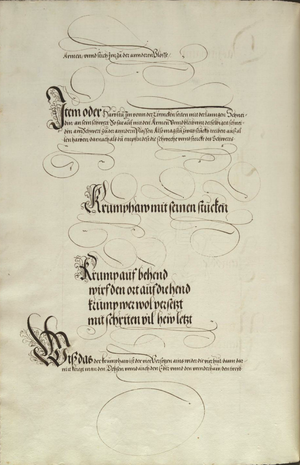|
|
You are not currently logged in. Are you accessing the unsecure (http) portal? Click here to switch to the secure portal. |
User:Kendra Brown/Latin Lew/84r
Jump to navigation
Jump to search
Munich 84r / PDF page 13
84r a
84r a Latin (Sandbox)
- Mutationum is usus est.
- Cum versus hostem de humero dextro tuo acriter ferias è supernis,
- isque tuum inpetum excipiat[^1],
- neque fortiter ensem teneat,
- tum sursum ensis tui aciem brevem iuxta ipsius ensem flectas,
- inde brachijs sublatis,
- mucronem superne super ipsius ense ingeras,
- pòst alteram nuditatem pungito.
84r a English (Sandbox)
- HE has need of the transformations.
- When you strike toward the enemy fiercely from above from your right shoulder,
- and HE would intercept your attack,
- and would not hold the sword strongly,
- then weave the short edge of your sword around up next to his sword[;]
- thenceforth (the arms having been lifted)
- you should thrust the sword from above on top of his sword
- then prick at the other opening.
84r a notes
- [^1]: excipiat is the equivalent for 'versetzt er'
- usus est is a special construction describing need. example with some explanation
84r b
84r b Latin (Sandbox)
- Sin autem Ictum ex latere sinistro formaris,
- aciemq[ue] longam eius ensi adiunxeris,
- brachijs levatis,
- eam aciem ab ense adversarij non removeas,
- ad inferiorem nuditate[m] sauciandum,
- eaq[ue] ratione duos habitus poteris exercere ex omnibus Ictibus p[re]scriptis,
- iuxta observationem,
- num hostis firmiter vel minus ensem teneat.
84r b English (Sandbox)
- But if, however, you formed a Strike from the left side,
- and you connected with his long edge using [your] sword,
- (the arms having been raised)
- [then] don't shift that edge back from the sword of the adversary,
- toward the lower openings that have been wounded;
- and you can employ two skills from all of the previously described Strikes using this method,
- immediately following the observation,
- whether the enemy holds the sword strongly or less [strongly].
84r b Notes
- parallel phrase, present in german (equivalent but not exact)
Missing Zettel verse from Dresden 89v (16)
German
- Krump auf behend
- wirf den ort auf die hend
- krump wer wol versetzt
- mit Schriten vil hew letzt
English (Garber)
- Crooked [cut] quickly upward
- Throw the point at the hands [on top of the hands].
- Crooked cut. Whoever counter acts well
- with many steps allows cuts [cuts last?]
English (Fritz)
- Krump upwards nimbly,
- throw the point onto the hands.
- He who displaces well with Krump,
- will wound many strikes with steps.
[Yeah, I cannot follow his last line]
84r c
84r c Latin (Sandbox)
- Ictus, qui curvus[?] dicit[ur] descriptio adhibitis omnibus eius habitibus.
- Ictus iam co[m]memoratus ex quatuor remotionibus[^2] unus est,
- contra quatuor custodias,
- hoc etiam habitu ictus qui a[utem] furore boum et aprorum appellationem accepit,
- debellantur,
- atq[ue] ictum inferum hoc modo exercebis.
- Si in conspectum adversarij processeris,
- et is contra te consistat ensem pro capite in custodia bovis ex latere sinistro tenens,
- tum sinistrum tu pr[a]eponas,
- iuxtaq[ue] humerum dextrum ensem contineas in custodia,
- verum ex ea in latus dextrum prosilias,
- et man[us] hostis acie longa saucies ex brachijs cancellatis.
84r c English (Sandbox)
- The strike which is called curved, a description of its application to all aspects of the art
- the strike which is now recalled to mind is one of the four actions of warding off/eliminations,
- against four guards,
- and additionally, by this aspect of the art[,] the strike, which takes its name from the rage of the ox and boar,
- is vanquished,
- and you will employ the lower strike in this way.
- If you proceed into range of the adversary,
- and HE stands against you holding the sword before [his] head in the ox guard from his left side,
- then you place the left in front,
- holding your sword next to your right arm in the guard,
- truly you leap forth from this into the right side,
- and you wound the hands of the enemy with the long edge from crossed arms.
84r c Notes
- [^2]: "quatuor remotionibus" is equivalent to "vier versetzen"

